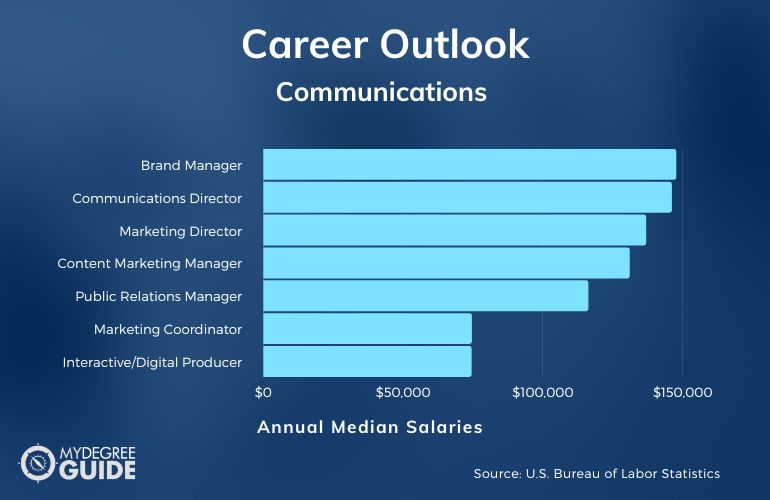What can you do with a communications degree? Choose your specialty and see what you could be doing after graduation.

Communications is a broad field, with room to potentially make between $30,000 and $44,000 right out of college (Bureau of Labor Statistics).
Editorial Listing ShortCode:
Let’s talk about the ways an on-campus or online communications degree can serve you as you make your way through the ranks of some of the most interesting and limitless career paths.
Types of Communication Degrees
There was a time when majoring in communications almost exclusively meant that you wanted to sit behind a news desk and talk into a camera. While many of the on-air names we all know have studied communications, the field has moved beyond that in recent years.
Let’s take a look at the degree specializations available that can uniquely prepare you for a place in the industry that you feel best fits your talents.
Click on an area you’re interested in to jump to that section of the page.
- Communications – General
- Film and Video
- Graphic Communication
- Health Communication
- International Business
- Journalism
- Public Relations
- Writing
The fact that we’re living in a world where every business and organization needs to have a “media voice” means that communications majors are filling a variety of visible and behind-the-scenes roles.
Communications majors are trained to know how to carefully measure the needs and desires for information among modern readers, viewers, and listeners.
No company can afford not to have masterful, socially aware communicators crafting and vetting every message in the age where social media rules, a post can go viral in a minute, and the public eye is always on the other side of the screen.
General Communications

A general communications degree is often the gateway for those who want to be heads of corporate communications at major brands and organizations.
This degree is also quite common among broadcasters, spokespersons, media planners, marketing executives, and human resources managers.
A general communications program can help a student learn how to be the “glue” that brings together so many different aspects of an organization by pulling deeply from the methods and psychology behind effective communication.
A degree in general communications can help a professional become capable of managing and mastering the various aspects that go into creating messages that land.
Choosing this degree can help you position yourself to be a person who bridges gaps and helps to create cohesiveness within an organization’s communication strategy.
Editorial Listing ShortCode:
On a practical level, this can look like the person who spearheads press events for an organization, the person who oversees all internal communications for a corporation or the person who manages “damage control” for a runaway narrative.
General communications may be a career-making area of study for someone who thrives on connecting with people through results-focused communication strategies. A general communications degree offers preparation for roles involving both internal and external communication for organizations.
This is a very well-rounded degree due to the fact that it can help you become capable of creating messages for diverse audiences and launching very tone-aware messages, which makes a communications degree worth it for may students.
Film and Video

A communications degree with a concentration in film and video can potentially open doors to jobs at major networks, studios, and media companies. This may be a great concentration for someone who is highly creative.
Of course, you’re going to need to be able to temper creative energy with deep organizational and technical skills when pursuing video and film communications.
A communications program that’s focused on film and video can help you obtain that all-important foundation for understanding the touchstones of effective visual communication.
Editorial Listing ShortCode:
This may offer a huge advantage over someone who has only studied the technical aspects of filming, editing, and cutting video. Pursuing this degree can help you obtain the skills necessary to craft message-driven, effective reels.
Most communications programs for film and video get pretty technical. They can help you enter the workforce with a mastery of industry staples like Adobe and Final Cut Pro by the time your student portfolio is built. This may be an excellent choice for an online accelerated communications degree as a big portion of your assignments will likely be focused on creating and editing original content for your portfolio reels.
Graphic Communication

A graphic communications degree is slightly different from a traditional degree in art or graphic arts because the focus is going to be placed on how to organize data visually for targeted consumption.
It’s important to realize that we’re not talking about art for the sake of art when it comes to this specialty.
However, some degree of artistic ability is generally a prerequisite for studying graphic communication because creating effective work is going to rely on having a deep understanding of how colors, proportions, fonts, and images all come together.
Editorial Listing ShortCode:
A graphic communications program is focused on how to use graphics to convey brand-specific messages to inform or prompt action. Graphic communicators are often asked to turn data into visual communication. This may take the form of everything from traditional print advertisements to app layouts.
A big part of going through a graphic communications program is likely going to be focused on building up your portfolio. A design program should leave you fully trained in the Adobe suite.After graduation, graphic communicators typically have a lot of freedom to skew toward marketing and media or focus on instructional design.
Health Communication

Hospitals, pharmaceutical companies, research companies, and medical organizations are some of the biggest employers in the field of communications.
The U.S. Bureau of Labor Statistics projects that the demand for healthcare-related occupations will grow by 14 percent in the next ten years. Here are some of the things that experts in the field of health communications handle:
- Promotional information
- Public health campaigns
- The dissemination of health information
Health literacy has never been more important. The information age is also bringing lots of misinformation and confusion. A health communication degree can help you learn how to collaborate with medical professionals to organize and convey information for the public.
Editorial Listing ShortCode:
A specialty in health communications can set you up for a career working as the spokesperson or head of communications for a hospital, research facility, or government agency. There is also the potential to use your mix of masterful communication and familiarity with the medical field to pivot to a career in pharmaceutical sales. It is also possible to use this degree to work as an advocate or liaison for patients in for-profit and not-for-profit settings.
International Business

Specializing in international business as a communications major may mean you want to be a mover and shaker. This specialty may be great for setting yourself up to be employed by global corporations that see information as a currency.
Here’s a look at some of the roles that are often filled by communications majors with specialties in international business:
- Executives
- Human Relations Managers
- Global Public Relations Managers
- Product Managers
- Marketing Managers/Executives
- Compliance Liaisons/Managers
Editorial Listing ShortCode:
A specialty in international business can be strengthened if it’s accompanied by the study of a foreign language.
Some communications majors decide early on that they are going to build up skills that can help equip them to be employed in specific economies around the world because niche-building can lead to greater employability.
For instance, you may decide that you’d like to structure your major to make you highly employable to a company that does a lot of business with a region like Asia, South America or the European Union.
Journalism

A focus on journalism may be a very natural fit for a communications major with a desire to research and report. While there is a lot of overlap, a general communications degree won’t necessarily equip you to function in modern mass media the way a journalism emphasis will.
A journalism specialty can help equip you to spread messages related to world events, developing stories, and entertainment.
Journalism majors learn how to gather, vet, and distribute information using journalistic standards.
Modern journalism programs integrate how to execute the established principles of the classic who, what, where, and when of a story with the complex realities of today’s 24-hour reporting cycle.
Editorial Listing ShortCode:
Most programs also train students to be comfortable, persuasive, and commanding in front of the camera or behind the microphone.
Communications majors with journalism specialties work at a variety of media and news outlets. Many people focus on journalism with the intention of publishing news articles or being in front of the camera.
A pivot can easily be made to the role of a news producer, senior editor, or chief correspondent.
Public Relations

Focusing on public relations while pursuing a communications degree may be a natural fit for anyone who knows how to stay cool, calm, and collected under pressure.
Companies need public relations specialists to handle social media, manage customer interactions, and maintain media relations. The skills for conveying messages, steering the narrative, and creating connections can be applied in person, in print, over the phone, or through digital channels.
Public relations experts work as media coordinators, agents, communications specialists, speechwriters, marketing executives, and press liaisons.
Editorial Listing ShortCode:
Many larger corporations need public relations experts to oversee internal communications in collaboration with executives and human resources. Being outgoing, adept at managing expectations, and quick on their feet can be very beneficial traits for anyone wanting to enter into the world of public relations.
A public relations program should teach the fundamentals of communications and ethics. The skills that are learned may be applied to communications needs within virtually any industry.
Many public relations experts find themselves working in corporate environments within the industries of consumer goods and services.
Writing

Being a wordsmith isn’t necessarily enough to break into the worlds of media, marketing, or publishing. A communications degree can help provide writers with a way to focus their natural skills on highly specialized and in-demand roles.
Technical writers create instructional or informational content for corporations, organizations, and private clients.
This means that strong writing skills must be accompanied by proper training for knowing how to conduct product research and determine the best method for communicating with the intended audience.
Editorial Listing ShortCode:
Being able to dismantle complicated concepts, incorporate customer feedback, and maintain consistency across brand communications are all things that technical writers do daily.
This is one of those career paths that can fly under the radar. However, the reality is that the Bureau of Labor Statistics places the median salary for technical writers at $72,850 per year. What’s more, the job outlook for a technical writer is much better than average.
What Do You Learn in Communications?

A communications degree can help set a student up with a robust toolkit of skills that cover situational management, use of language, research methods, and communication law.
In addition, students pursuing this degree often study listening skills and nonverbal signs that can help them become intuitive masters of giving and receiving information. Here’s a look at some of the common courses included in communications programs:
Communication Behavior: looks at the social science behind individual and collective attitudes and beliefs
Interpersonal Communication: focuses on the examination of communication theories, discussion of concepts related to listening and perception, dissection of communication barriers, and structure of conflict neutralization
Mass Media: focuses on the present-day delivery of messages, images, and ideas
Organizational Communications: focuses on the flow of communication in the workplace and corporate channels
Persuasion: focuses on the ways theories of effective communication can be adapted to convey brand messages today
Research Methods: looks at the methodology and implications of social research
Political Communications: examines the interlinking relationship between politics and the media by looking at advertising, campaigns debates, and speeches
A robust communications program will also cover special and emerging topics. Courses often look at topics like activism in media, visual culture, and data analysis for communications. With topics this interesting, there’s a good chance you won’t be tempted to skip any classes.
What Can You Do with a Communications Degree?

It’s no exaggeration to say that communications majors work in all industries inside and outside of the media world. Many people who major in communications are very focused on applying their degrees and skills in a very front-and-center capacity as a spokesperson or media figure.
Others prefer to take a path that’s focused on facilitating communication within an organization in a highly specialized industry. Let’s take a look at some of the job titles that are held by communications majors:
- Journalist/Reporter/Correspondent
- Publicist
- Editor
- Content Editor
- Multimedia Director
- Producer/Executive Producer
- Media Planner
- Head of Programming
- Human Resources Specialist
- Customer Service Manager/Brand-Integrity Manager
- Spokesperson/Ambassador
- Corporate Communications Specialist
- Recruiting Manager
- Public Relations Practitioner
- Graphics Specialist/Visual Communications Specialist
- Social Media Manager
- Press Secretary
- Account Executive
- Technical Writer
- Market Research Analyst
- Interpreter/Translator
We’re really looking at skills that can help you weave yourself into a variety of industries because competent communication is so vital to the existence and flow of every organization.
Focusing on a specialty is going to be really important for roles that require knowledge about more technical aspects of communication.
Also, any language-specific or culture-specific skills that are going to set you up to work for organizations in foreign economies will be important for giving your communications degree the weight it needs to make you competitive.
How Much Do Communication Majors Make?

It’s no exaggeration to say that the sky is the limit when it comes to a communications degree when you consider the fact that famous people like Oprah Winfrey, Spike Lee, Jerry Seinfeld, Mathew McConaughey, and J.Cole all have degrees in communications.
The actual salary that you will earn as a communications professional will depend on things like job title, years of experience, and hours worked.
An entry-level communications graduate who is just getting started may see a salary in the range of $30,000 to $44,000. According to the Bureau of Labor Statistics, this is the range for the bottom earners, it may be due to little to no experience at all. It could also be due to location or the industry.
Mid-level communications employees have average salaries between $39,000 and $75,000. Experienced, senior-level communications specialists may reach salaries of $72,000 to $147,000.
What Is the Communications Degree Salary Range?

The general salary range for a communications major is $30,000 to $147,000. It is quite common for communications professionals in management roles to make six-figure salaries.
Here’s a look at the average salaries for commonly held communications jobs, according to the Bureau of Labor Statistics:
- Brand Manager: $147,620 per year
- Communications Director: $146,040
- Marketing Director: $136,850
- Content Marketing Manager: $130,980
- Public Relations Manager: $116,180
- Marketing Coordinator: $74,510
- Interactive/Digital Producer: $74,420
- Social Media Planner: $64,230
- News Producer: $64,030
- Human Resources Specialist: $61,920
- Public Relations Specialist: $61,150
- News Anchor: $53,410
Salary ranges can vary drastically due to the fact that many communications majors go on to hold important roles at production, news, and entertainment companies. On-air talent and production heads can potentially command salaries that are very far outside the average.
What’s more, some communications experts actually prefer to provide services to several companies on a contract basis because of the flexibility this offers.
What Are the Best Entry Level Jobs for Communication Majors?

Getting in the door at a major media company may be worth its weight in gold when it comes to a long-term career plan. Many communications majors are able to get a foot in the door by taking on assistant roles within departments.
Here are some of the best entry-level jobs for recent communications graduates:
- Public Relations Assistant
- Account Executive
- Social Media Coordinator
- Assistant Brand Manager
- Editorial Assistant
- Production Assistant
Working in a support role within a company can be one of the best ways to show off your talent and foster relationships with people who are in a position to recognize your hard work. Success in the media industry is often about relationships.
Many larger companies are more than happy to promote within because it eliminates the need to spend money on recruiting and training.
What’s more, the fact that you’ve proven that you’re a good fit with a company’s internal culture can often enable you to be promoted to a higher role even if there is a skills gap that would prevent you from being considered as an outside applicant.
Professional Organizations for Those with a Communications Degree

As someone who is interested in communications, you probably already understand the importance of networking and industry engagement.
Joining a professional association can be a great way to stay connected with industry trends, attend industry events, and network with the people who are shaping your industry. Here’s a list of the must-know organizations for communications majors:
- American Advertising Federation
- American Marketing Association
- Public Relations Society of America
- Society of Professional Journalists
Professional associations sometimes provide member-only access to job boards, live networking opportunities, seminars, webinars, training opportunities, and more. You may also be able to nominate your work for recognition at annual awards ceremonies.
Is a Communications Degree Worth It?

Yes, a communications degree is worth it for many students. The Bureau of Labor Statistics is projecting 4% job growth in media and communication occupations over the next 10 years. Common careers in this field include news anchor, social media planner, marketing coordinator, public relations manager, and brand manager.
A communications degree has never been more relevant. What’s more, there have never been so many opportunities to work in so many vastly different industries as a communications expert.
Companies and organizations need to know that job candidates understand the technical, ethical, and organizational concepts behind communicating effectively in today’s screen-based, sound-bite-heavy world.
The first step to opening up new professional worlds is to apply to university programs that offer communications degrees. Spend some time vetting programs to discover what’s compatible with your personal and professional goals.
A degree in communications can help take you from being someone with a natural gift for communication to a highly capable communications expert.
